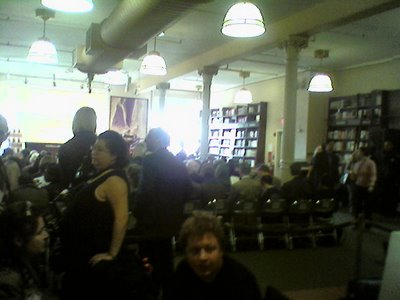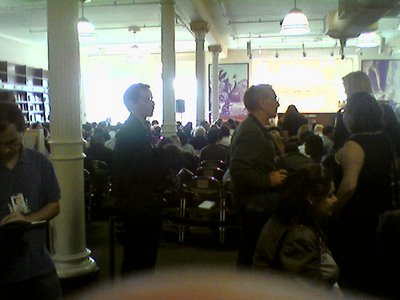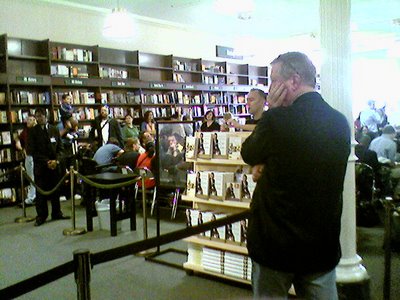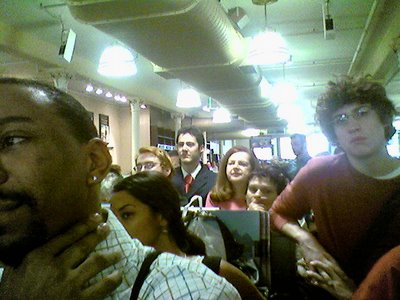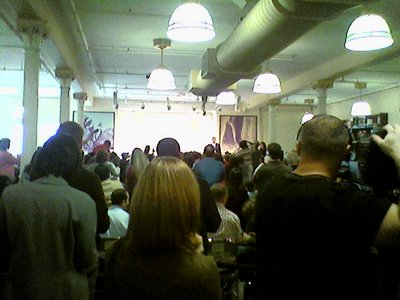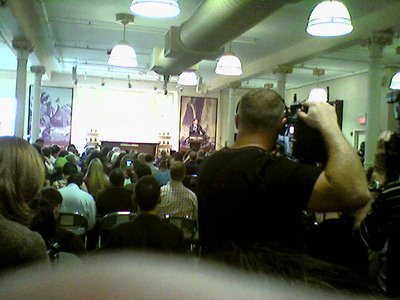(Pause to exult over resumed internet access...)
Did the Moth Storytelling Slam last night and was only one of the three that didn't get picked. So there's nothing to say there, except that Andy Christie won again, and it became clear that if I'm ever going to win one of these things, I either have to lead a much more interesting life, or wait until a night where at least five people I can think of all come down with laryngitis. And, of course, a night where there are only ten names in the hat, so everyone gets called.
Anyway, for once I thought I'd share the story that I would have told, because I happen to have it written down as the introduction to a book I'm working on, called (tentatively)
How To Love God and Not Be a Jerk. The theme was "Deception." See if you can figure out where I would have thrown in a reference to that.
It's a story I've told often, so I apologize if any of you have heard it.
***************************************************************
I can pinpoint exactly when my theology changed and I lost my certainty about traditional evangelical Christianity. It was in 1991, when I sat through a Sunday school lesson taught by a man named Richard Ruiz. Sunday school lessons aren't supposed to matter. This one changed the way I see everything.
The warning signs of radicalism were there ahead of time. For one thing, Richard Ruiz was the only avowed Democrat in the sizeable Evangelical Free Church I went to. Normally, a man like this shouldn't have even been in our church at all. It says volumes about what a wonderful man he was (and is) that he was not only a member of our church, but he'd been elected to the elder board. This is why I think he was brought in to speak--if he'd been a Democrat from the outside, he would have been eyed very suspiciously before he was allowed to teach. But Richard was an elder, so they must have figured he was safe. Anyway, on the day that I'm describing, someone cancelled at the last minute, and Richard was called in to supply our college-and-young-singles group with the Sunday School lesson. It was a simple lesson, and I'm sure he didn't intend it to lead me where it did.
"Today we're going to talk about Adam and Eve," he said, "and how God's law is different from man's law." Simple enough. Like most Sunday school lessons, this sounded like it didn't even need to be taught. We already knew that man's law was bad and crushing, and God's law was good and worth following. We had our Bibles open to Genesis before he had even finished his introduction.
"Now, you know the story. God creates Abraham, and then tells him about the fruit of the Tree of Knowledge. What does God say?"
Someone raised a hand. "Don't eat the fruit."
"Right." And then Mr. Ruiz said, "Now what does that mean?"
We were quiet. Wasn't it obvious? Richard didn't think so.
"What if he licks the fruit? Has he eaten it then? What if he bites into it, but then spits out the pieces? What if he swallows, but regurgitates it? What if he squeezes it into a glass and just drinks the juice?"
Some people laughed, and so did Richard, but he said, "It sounds silly, but I'm serious. I just want you to notice that there's an obvious point at which God's law has been broken--when Adam chews and swallows an entire fruit--but there's also a wide range of activities that God did not specifically define. There's a big gray area where God trusted Adam to act within his conscience.
"So now Eve gets created. And Adam passes on God's law. What does he tell her?"
"Don't eat the fruit," someone said.
"No! Look at the verse. It's down in chapter 3, where Eve's telling the snake the way she heard the rule: 'You shall not eat it or even touch it, lest you die.' When Adam passed the word along, the rule changed from 'Don't eat the fruit' to 'Don't touch the fruit.' Do you see what's happened?"
"It's the same thing," someone said. "If you're eating the fruit, you're touching it."
"No. The difference is that touching is a discrete action. You can tell by looking whether or not someone is breaking the law. It's extremely easy to judge, and there's no gray area involved. Did she brush her arm against it? She touched the fruit. Did she trip and bump her head on it? She touched the fruit. When Adam passed the law on to Eve, he made his job a lot easier, by defining the sin in a way that minimized the number of interpretations he had to work through.
"But in the process, he also did something else. He told a lie and he misrepresented God. Immediately after she talks to the serpent, Eve takes the fruit to Adam. They eat, and then the scripture says, 'immediately their eyes were opened,' and the Fall occured. If touching the fruit was a sin, the Fall would have happened before she even made it back to Adam. The sin was eating the fruit. Touching it never mattered, even though Eve had been told it did, and if she had accidentally touched the fruit, she would have felt condemned for no reason.
"And I submit to you that that is what human beings do all the time when they're given God's law. They turn around and make it harsher in order to make it easier to understand and follow. So whenever we're faced with a rule, we have to be sure to go back and ask, 'Is this what God originally intended, or has mankind been tampering with it?' Otherwise we'll wind up wasting time on issues that don't matter."
He went on to make other points, which I assume were about legalism, a popular topic in my church. Was dancing okay? Were R-rated movies seeable? No doubt he was going to distinguish between the real issues (love your neighbor, don't have premarital sex, etc.) and these non-issues that mere humans construct. But I honestly don't remember anything else about that lesson. My own mind started playing with the implications. Could Richard be right? Was it possible that God is always giving his commandments with gray areas built in, and we're always trying to eliminate them?
Then I thought, "That's ridiculous! We all know that God has definite rules and he wants us to follow them. What else is religion if it's not a moral guide?"
And then I thought about Jesus, and I felt something like scales fall from my eyes. I suddenly remembered all the times that Jesus was asked a simple moral question by the Pharisees ("Who is my neighbor?" "What should we do with this adulterous woman?", "Should we pay taxes or not?") and he didn't provide the simple answer they were looking for. Instead, his responses wound up questioning the questioners and asking them to judge for themselves. Pieces fell into place. Wow! I thought. What if Jesus really was interested less in handing out rules and more interested in developing people's consciences? Suddenly I could understand why he had mercy on prostitutes and traitors, but hated the Pharisees with such great passion. After all, the Pharisees had rules for everything, from whether to heal on the sabbath, how much to tithe, which offering to deliver when. If you were a Pharisee, you could go your whole life and know exactly how to act in every situation and know God's stance on everything and...
...And then I looked around the room at my fellow evangelical Christians and almost gasped.
My god, I thought.
I am in the church of the Pharisees!Suddenly it all made sense. Everything we did was for some biblical reason. Everything question we had was certain to have a biblical answer. I had always been a little bothered by the fact that we had a tendency to deliver divine pronouncements on modern moral issues (such as genetic engineering) by appealing to verses in the Bible that were clearly not intended to answer these questions. Now I knew why: the Bible was being pressed into service to provide a solution. But maybe that wasn't God's agenda! Maybe God was more interested in the process of facing the problem. The more I thought about it, the more it seemed like God might actually be interested in challenging us with moral questions, and it seemed like my church was bound and determined to assassinate every question before it could cause problems and doubts. It was a few more months before I left evangelicalism entirely, but after that day, I started looking for the exits.
[Note: this is, of course, an extremely truncated version of what actually happened, suitable for a five minute storytelling competition. In actual fact, the next thing I felt was, "Wow! The world is actually exciting and adventurous!" I didn't even know why I felt this, and I'd certainly never registered that my spiritual life was in any way trammeled before. But at that very moment, adventure entered my life. Alas, further expansion of this point deserves either another post or (fingers crossed) the completed book.]
Labels: Dave Update, religion

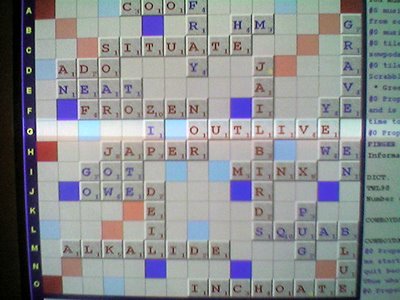 This screen, from an online Scrabble game, represents what I think is the highest score I've ever managed, in or out of a tournament. 578 points! FIVE bingoes! This is just shortly after I crossed another threshold, getting an online rating of 1300, which I think is just about as high as I can go without memorizing The Top 500 Bingoes and the four- and five-letter words.
This screen, from an online Scrabble game, represents what I think is the highest score I've ever managed, in or out of a tournament. 578 points! FIVE bingoes! This is just shortly after I crossed another threshold, getting an online rating of 1300, which I think is just about as high as I can go without memorizing The Top 500 Bingoes and the four- and five-letter words.